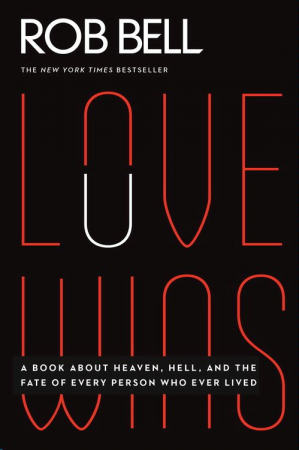
Year Published
2011
Authors
Topics
Synopsis
Overall Rating
Final Thoughts
Year Published
2011
Authors
Topics
Synopsis
Final Thoughts
Overall Rating
So, first a little bit of background of what I am doing. I used to watch Law and Order: SVU all day long. However, in an effort to be a more productive human being, I have canceled my internet through Comcast and will rely solely on my phone data. This forces me to stream Netflix less often and helps me to do more constructive things with my time, like read books.
One of these things I will be doing (as mentioned above) is reading one book a month. Through the process, I will blog on thoughts/reactions I have to the book. At the end of the month/book, I will write a full review of the book with my thoughts on it, implications it has, and whatever else flows through my fingers into the interwebs.
For this month, I will be reading Love Wins by Rob Bell. I chose this book because it has garnered a lot of bad publicity in the Christian community, and I wanted to see if it deserved it. (All too often Christians jump on something or someone before completely understanding the issue and end up looking like jerks because they refuse to take an honest look at something before passing judgment.) That is not my intention, nor will I be doing that with this book. I will honestly read it with an open mind, and see what he is saying.
I’m currently a chapter and a half in and, up to this point, I think most people bashing his book did not read it properly. (I know I’m not done with the book yet, so don’t take this as my final thoughts on the book, just on what I’ve read up until this point). I have not seen anything thus far in the book that is anti-biblical, or anti-heaven or hell as many of the critics claim Bell is saying.
He asks many questions about heaven and hell and life and what it means to be saved (all of which are valid questions that I think even the most devout Christian has asked at some point in their life). He also begins to discuss how heaven is talked about in the Bible, specifically in Jesus’ teachings. I’m just past the part where he addresses that heaven/eternal life (as talked about by Jesus) is not something that is somewhere else, but something that happens on earth. Sometime in the future, God will declare judgment on those who were unjust, and those who did evil, and those who oppressed. After that time, God will restore the earth, with the help of those who have chosen to partner with him to bring justice (namely- Christians) to a place of peace and harmony.
That’s a very Biblical concept. The New Heaven and New Earth. Yeah, it may shake up the traditional Christian understanding of dying and going to heaven (and perhaps that still happens once one dies before the time of judgment (as Christ told the prisoner next to him they would see each other that day in paradise, not at some later time)), instead it is about a renewed earth where there is no violence, no death, no suffering, no pain, no injustice. I think this is a more promising future than the idea of being swept away into the clouds to be in a new place forever. We’ve spent our entire lives here on earth, we were created here on earth to live here and cultivate it. Why would God then take us away and make everything on this wonderful planet moot? If His creation was so good, why would he abandon it when it was time to redeem humanity?
I’m excited to keep reading this book and see if Bell keeps on a Biblical track with what he is saying. It’s definitely an interesting read. Say what you want about Bell and his theology, but he is definitely a talented writer and communicator, and I admire him for that.
One last thing. Throughout this process and my posts with thoughts, I encourage all of you to post your thoughts/questions/concerns/comments/whatever-you-might-have in the comments. These types of things need to be addressed in an open environment, and what’s more open than the internet? Right?
I finished this book a week ago, it has just taken some time to find an opportunity to blog about the book and what I thought whilst reading it. I first want to say that I think most people who criticize this book have done one of two things: 1)Many of them have no read the entire book. 2) Others read the book expecting him to say certain things and read that into what he was saying, rather than actually reading what he was saying. Both of these create an unfair opinion on both the book and the author.
So what did I think about the book? I really liked it. Now, on to why.
While I was reading the book, I felt like Bell asked more questions than he answered. While this is both a problem and a good thing, I enjoyed it. It’s a problem for people looking to the book to find answers, as they could be left wondering more than they began. But it is also a good thing because it shows Bell is not one who simply states things but is willing to pose the difficult questions as well.
As for what he is actually saying, I’ve heard many people say that Bell does not believe in heaven or hell. To the contrary, he very strongly believes in both. However, he does provide some nontraditional viewpoints on each. Ultimately, though, I think Bell has it more accurately than most conservative Christians. Before you start screaming at me, allow me to take a few moments to explain what I find him saying (I could be wrong) and why I think he could be right.
First, Bell is saying that all have the opportunity to get into heaven. Some have taken this to mean universalism (as in- everyone goes to heaven when they die, no matter what). I can slightly see where they might infer this from the chapter when he talks about people encountering Jesus in different ways. However, I think this topic fits more with Natural Revelation. In Romans, Paul talks about how all of the creation speaks of God’s existence so that no man is without excuse.
There are some who take from this the idea that since people can be condemned under God for not worshiping Him even without expressly hearing about Him, then they can also be saved in this way- not by hearing the name of Jesus preached on TV, but by recognizing that there is a God and that we are nothing without Him. This doesn’t go so far as to say every religion gets one into heaven, as most universalists think, but that those who have no heard about Christ can still be saved because they know the idea of Christ, as Bell touched on in his book.
With that in mind, Bell’s idea of everyone getting into heaven is more about opportunities to get into heaven.Most Christians believe that you have this life to choose whether or not you will serve God, and once they die their chances are up. From death until forever they will either live with God in heaven or without him in Hell. Many have noted, however, that this seems to contradict ideas that God wants all to be saved. Bell then asks the question, does God get what God wants?
This is a very valid question. If God wants everyone to be saved, is God beyond getting what God wants? We know he cannot force us to be saved because then we would not have freedom. So is it possible that God gets what God wants, and we get what we want? Bell argues yes. He argues that even after death, people have the opportunity to choose God. We know that at some point every knee will bow before God. (Romans 14:11) With that, there has to be some form of reconciliation possible once someone dies.
Bell explains it this way. All throughout your life to choose to either live in love with God or live for yourself and dishonor God. Once you die, you will still do the same. What you wanted on earth (be it justice, mercy, peace or war, hatred, selfish desires) will be the same when you die. However, just like you have the choice on earth, when you die you will be able to choose. You can grow into a person who desires justice and mercy. You are not stuck in your earthly mindset for the rest of eternity.
While a stretch, Bell pulls from Romans 21:25 where it says the gates will never be shut to insinuate that people are welcome to join into God’s kingdom at any point they choose to no longer live for themselves. While I think the reference is a stretch, I agree with the idea. If God truly wants all to be saved, He has to be welcoming to them even after death if they choose to follow Him. A just God would not turn them away after their death simply because they did not recognize him during their limited time on earth.
Bell also pulls from Corinthians for this idea (1 Corinthians 3:15) where Paul talks about one’s work being put through the fire. Bell seems to be saying that people will go through the fire and then enter into heaven, but will be as those who went through the fire. Would this not seem to indicate that those who did not choose to follow God on earth are allowed the opportunity to do so in the afterlife, but will be put through the fire first? I think that’s a fair question. I do, however, think it needs more research than Bell gave it in the book before a definite answer is given.
Now, what does Bell say about hell? Some have argued that Bell does not believe in a literal hell. He does (he stated so in his book.) The difference is they and he might have different definitions of literal. Those arguing against him see Bell as saying hell is only on earth, and once you die you are in heaven whether or not you believed or not because you lived your hell on earth. I agree that there is hell on earth. We’ve all experienced our own times of hell, our own periods where nothing goes right (be it because of something we’ve done, or something someone else has done.)
However, Bell is also arguing for hell after death. This is where things get a bit tricky, though, and I will help to explain a little bit of what I think he is saying (as well as what I believe) by putting in some of my own thoughts. There seems to be a common belief in the church that hell is separate from God and His kingdom. However, this is contradictory. If we believe that everything is God’s, then hell is God’s as well. So if one is to believe in a physical place called hell, they have to believe that God is reigning over it (unless they don’t believe that God reigns over everything.)
Then the question becomes is God the one doing the punishing? It could be. I had a professor one time explain hell this way- God is doing the most loving thing by giving you what you wanted. If you wanted to live apart from Him your entire life, He will give you that in your death. But I’m not sure I believe that. I see throughout the Bible God pursuing people. Those who run from Him, He never gives up on. He’s constantly chasing humanity, saying, “Come back to me.” Why, in death, would he stop that pursuit? How could His love and desire to have a reconciled relationship with all of humanity suddenly change once a person dies?
Enter Bell’s (and perhaps my) alternate opinion on hell. There was one time a few years ago I jokingly said, “Hell is the ghetto of God’s kingdom.” Allow me to take a moment to explain. We’ve already addressed that God reigns over everything. Therefore, there is no reason to believe that hell is outside of his dominion. Now, some of my own personal beliefs about poverty and the like are about to come out to help illustrate this point so bear with me, and please don’t hate me for them.
When one thinks about the ghetto they think typically think of poverty, crime, and injustice. In Heaven, none of these things exist. And, on earth when these things do exist, it’s because people are not living in love, peace and justice. Therefore, the “ghetto” of God’s kingdom is where people are still choosing to live in hatred, selfishness, crime, and injustice. It’s not a place separate from God’s kingdom, but a place within God’s kingdom where God puts those who refuse to live in love and mercy with Him. Once one chooses to live in a way that aligns with God and His will, they are welcomed into the full glory of heaven, and are brought out of the ghetto.
Bell’s thoughts are slightly different. Bell brings in the story of the prodigal son. In this story, the son who stayed home the whole time is in “hell” because he is unwilling to accept his father’s love. For Bell, hell is more like being a party you don’t want to be at, but had no choice to not go, and not allowing yourself to have fun. While I think a component of that is right, I think there’s more to it.
I fully believe that being in hell is one’s choice. Just like the elder son in the story, one’s being in hell is purely due to one’s choice to reject God’s love and refuse to love Him back. However, I don’t think that one is in the midst of the party. I don’t see God allowing those who have not chosen to love Him and live with His attributes at heart to take part in the full celebration of heaven. Put a different way, those who are in “hell” are not at the party with those in heaven and simply having a terrible time. There has to be some form of distinction between the two, where the distinction is still solely the responsibility of the person- they chose to be where they are at, and can choose to enter into God’s grace at any time. (Enter my analogy of hell being the ghetto in the kingdom of God).
Ultimately, as Bell states, love wins. Everything comes down to love. Love does not allow for sin or wrong doings either to oneself, or anyone else. For this reason, God cannot let people into heaven unless they choose to live in love, rather than in selfishness. With that, though, love would not deny someone the opportunity to change their mind about how they want to live. That restricts freedom, which is a component of love. So, in the end, whether sending someone to hell or allowing someone into heaven, love wins, because God is love.
At this point, while not exhaustive, I feel this is a complete enough discussion of the two main issues within the book to suffice for the person of this post. If you have any questions or would like to discuss this further, please feel free to contact me, I would love to talk about it with you. As always, you’re welcome to post comments, questions, concerns in the comments as well and I will reply to those in turn.




